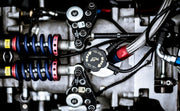
As a car owner, understanding the basic auto parts of your vehicle is crucial for maintaining its performance and longevity. Whether you're dealing with routine maintenance or unexpected repairs, knowing what these essential components do can help you make informed decisions and avoid costly issues. This guide will introduce you to the top 10 essential auto parts every car owner should be familiar with, ensuring your vehicle stays in top shape.
Engine Mechanical Parts
The engine is the heart of your vehicle, and its mechanical parts include vital components like pistons, camshafts, and crankshafts. These parts work together to convert fuel into energy, powering your car.
Why Engine Parts Matter
Understanding your engine’s mechanical parts helps you recognize signs of wear or damage, such as unusual noises or decreased performance. Regular maintenance and timely repairs can extend your engine's lifespan and keep your car running smoothly.
Brake Pads and Discs
Brake pads and discs are critical for your safety on the road. These parts work together to slow down or stop your car when you apply the brakes.
Signs You Need to Replace Your Brakes
Look out for squeaking noises, a spongy brake pedal, or vibrations when braking—these can indicate worn brake pads or discs that need replacing. Regular inspections can prevent brake failure and ensure reliable stopping power.
Suspension System: Front and Rear Gear
Your vehicle’s suspension system, including both front and rear gear, is responsible for providing a smooth ride by absorbing shocks from the road. It also helps maintain control and stability while driving.
Common Suspension Issues
Worn-out shocks, struts, or springs can lead to a bumpy ride, uneven tire wear, and poor handling. Recognizing these signs early can help you maintain your vehicle’s comfort and performance.
Cooling and Radiator Systems
The cooling systems, including the radiator, are essential for preventing your engine from overheating. It circulates coolant to absorb and dissipate heat, keeping your engine at an optimal temperature.
Maintaining Your Cooling System
Regularly checking your coolant level and inspecting the radiator for leaks can help prevent overheating, which can lead to serious engine damage.
Sensors and Electrical Components
Modern vehicles rely on various sensors to monitor everything from engine performance to tire pressure. These sensors send real-time data to your car’s computer, helping it adjust operations for efficiency and safety.
Key Sensors to Know
Important sensors include oxygen sensors, mass airflow sensors, and temperature sensors. Understanding their function can help you troubleshoot issues and keep your vehicle running efficiently.
Engine Valve Components
Engine valves control the flow of air and fuel into the engine and exhaust gases out of it. They play a critical role in the engine’s combustion process.
Valve Maintenance Tips
Regular valve adjustments can prevent engine misfires, poor fuel economy, and power loss. Knowing when to service your valves can save you from costly repairs down the line.
Periodic Maintenance Essentials
Routine maintenance, such as oil changes, filter replacements, and tire rotations, is crucial for the longevity and performance of your vehicle. Following your vehicle’s maintenance schedule helps prevent breakdowns and keeps your car running efficiently.
Must-Do Maintenance Tasks
Key tasks include changing the engine oil, replacing the air filter, and checking the tire pressure. Staying on top of these can prevent small issues from turning into major repairs.
Body and Bodywork Components
While often overlooked, body parts such as bumpers, fenders, and panels are crucial for protecting your vehicle’s internal components and maintaining its aesthetic appeal.
Addressing Bodywork Issues
Minor dents and scratches can lead to rust and structural damage if left untreated. Regular inspections and timely repairs can preserve your vehicle’s appearance and integrity.
Outdoor Lighting Products
Proper lighting is crucial for safe driving, especially at night or in poor weather conditions. This includes headlights, brake lights, and turn signals.
When to Replace Lights
Dimming or flickering lights are signs that your bulbs may need replacing. Regularly check all lights to ensure they’re functioning correctly, and replace them as needed to maintain visibility and safety.
Radiator Components
The radiator is a key part of the cooling system, helping to dissipate heat from the engine. A well-functioning radiator prevents your engine from overheating, which is vital for performance.
Radiator Maintenance
Checking the coolant level and inspecting for leaks regularly can keep your radiator in good condition, preventing overheating and potential engine damage.
Learn Your Car’s Essential Parts
Knowing these essential auto parts and their functions can help you take better care of your vehicle. Regular maintenance and timely repairs not only ensure your safety on the road but also extend the life of your car. Whether you’re an experienced driver or a new car owner, this knowledge is invaluable for keeping your vehicle in peak condition.







